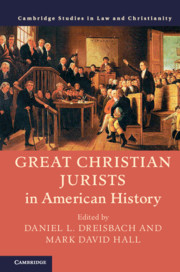Book contents
- Great Christian Jurists in American History
- Law and Christianity
- Great Christian Jurists in American History
- Copyright page
- Dedication
- Contents
- Contributors
- Preface
- Introduction: Christianity and American Law
- 1 John Cotton and Roger Williams
- 2 John Winthrop and the Covenantal Ideal
- 3 Friendly Laws: William Penn’s Christian Jurisprudence
- 4 The Friendly Jurisprudence and Early Feminism of John Dickinson
- 5 Roger Sherman, Oliver Ellsworth, and the Formation of America’s Constitutional Order
- 6 John Jay: The First Chief Justice
- 7 James Wilson
- 8 Was Justice Joseph Story a Christian Constitutionalist?
- 9 Harvard’s Evangelist of Evidence: Simon Greenleaf’s Christian Common Sense
- 10 John Marshall Harlan the Elder
- 11 Judicial Conservatism and Protestant Faith: The Case of Justice David J. Brewer
- 12 John T. Noonan, Jr.: Catholic Jurist and Judge
- 13 The Integrative Christian Jurisprudence of Harold J. Berman
- 14 Antonin Scalia: Devout Christian; Worldly Judge?
- 15 The Insights and Transitions of Mary Ann Glendon
- 16 A Reformed Liberalism: Michael McConnell’s Contributions to Christian Jurisprudence
- 17 The Jurisprudence of Robert P. George
- Index
14 - Antonin Scalia: Devout Christian; Worldly Judge?
Published online by Cambridge University Press: 24 June 2019
- Great Christian Jurists in American History
- Law and Christianity
- Great Christian Jurists in American History
- Copyright page
- Dedication
- Contents
- Contributors
- Preface
- Introduction: Christianity and American Law
- 1 John Cotton and Roger Williams
- 2 John Winthrop and the Covenantal Ideal
- 3 Friendly Laws: William Penn’s Christian Jurisprudence
- 4 The Friendly Jurisprudence and Early Feminism of John Dickinson
- 5 Roger Sherman, Oliver Ellsworth, and the Formation of America’s Constitutional Order
- 6 John Jay: The First Chief Justice
- 7 James Wilson
- 8 Was Justice Joseph Story a Christian Constitutionalist?
- 9 Harvard’s Evangelist of Evidence: Simon Greenleaf’s Christian Common Sense
- 10 John Marshall Harlan the Elder
- 11 Judicial Conservatism and Protestant Faith: The Case of Justice David J. Brewer
- 12 John T. Noonan, Jr.: Catholic Jurist and Judge
- 13 The Integrative Christian Jurisprudence of Harold J. Berman
- 14 Antonin Scalia: Devout Christian; Worldly Judge?
- 15 The Insights and Transitions of Mary Ann Glendon
- 16 A Reformed Liberalism: Michael McConnell’s Contributions to Christian Jurisprudence
- 17 The Jurisprudence of Robert P. George
- Index
Summary
Justice Antonin Scalia was a towering figure in jurisprudence and legal culture. Among other things, he was the most eloquent and prominent proponent of the idea that the Constitution should be interpreted according to its “original meaning.” Scalia was also a devout Christian: a traditional Catholic who set forth his Christian beliefs with honesty, pungency, and wit. He frequently told the story how during his college oral examinations, he was asked the most significant event in history; he answered, the Battle of Waterloo, whereupon the professor “shook his head sadly and said, ‘No, Mr. Scalia. The Incarnation.’” The lesson for the young Scalia: “[Never] separate your religious life from your intellectual life.” Yet this most publicly devout justice also frequently made clear that his beliefs had nothing to do with his judicial role. His job, he emphasized, was merely to apply the meaning of the text without regard to policy considerations or moral values, including religious values. “I’m a worldly judge,” he often said. This presents a puzzle: did Scalia end up separating his religious life from his jurisprudence, the core of his intellectual life? Or was he still somehow a distinctively Christian judge? The solution, I suggest, lies in distinguishing his first-order legal conclusions, which were driven largely (although not solely) by his positivist judicial method, from his second-order choice of that method, which may well have reflected aspects of his personal outlook on the world, including his faith.
Keywords
- Type
- Chapter
- Information
- Great Christian Jurists in American History , pp. 245 - 264Publisher: Cambridge University PressPrint publication year: 2019



